Curriculum
Acute Care Conference Series | Lunch Conferences | Departmental Conferences | Inpatient Noon Report | Outpatient Education | Grand Rounds | Innovative Wednesday Curriculum | Journal Club | Symposia | Board Review | In-Training Exam in Internal Medicine | Rising PGY-3 Leadership Seminar | PGY-2 Resident as Teacher Symposium | Simulation Center | Intern Patient Safety Skills OSCE | PGY-1 Common Critical Care Curriculum | Point-of-Care Ultrasound | Schwartz Rounds | Rotation Pre- and Post-Testing | International Activities
Note: Due to the COVID-19 pandemic, we have converted our daily Resident Inpatient Noon Report Case Conference and Lunch Conference Series to a hybrid format with both in-person and virtual options for attendance. Our ability to provide daily resident instruction has continued uninterrupted throughout the pandemic, and resident participation in these online conferences remains strong and enthusiastic. In addition, we have modified our simulation center training sessions to allow for appropriate social distancing while still providing the same educational content and experience for our residents.
The CMC Internal Medicine Residency curriculum includes many different educational opportunities. Please take a moment to learn more about our educational curriculum by using the links above for easy navigation.
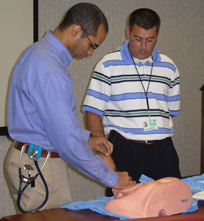
Acute Care Conference Series
Lectures are Monday through Friday at 12:45 p.m. from July to mid-August.
Topics include Fluids and Electrolytes, Drug/Alcohol Withdrawal syndromes, Tachyarrhythmias, GI Bleeds, and Antibiotics, among many others.
- The lecture series culminates with a five-day seminar on EKGs - basics through arrhythmias.
Lunch Conferences
Following the completion of the Acute Care Conference Series curriculum, our regular Lunch Conference schedule begins. Lectures are held Mondays, 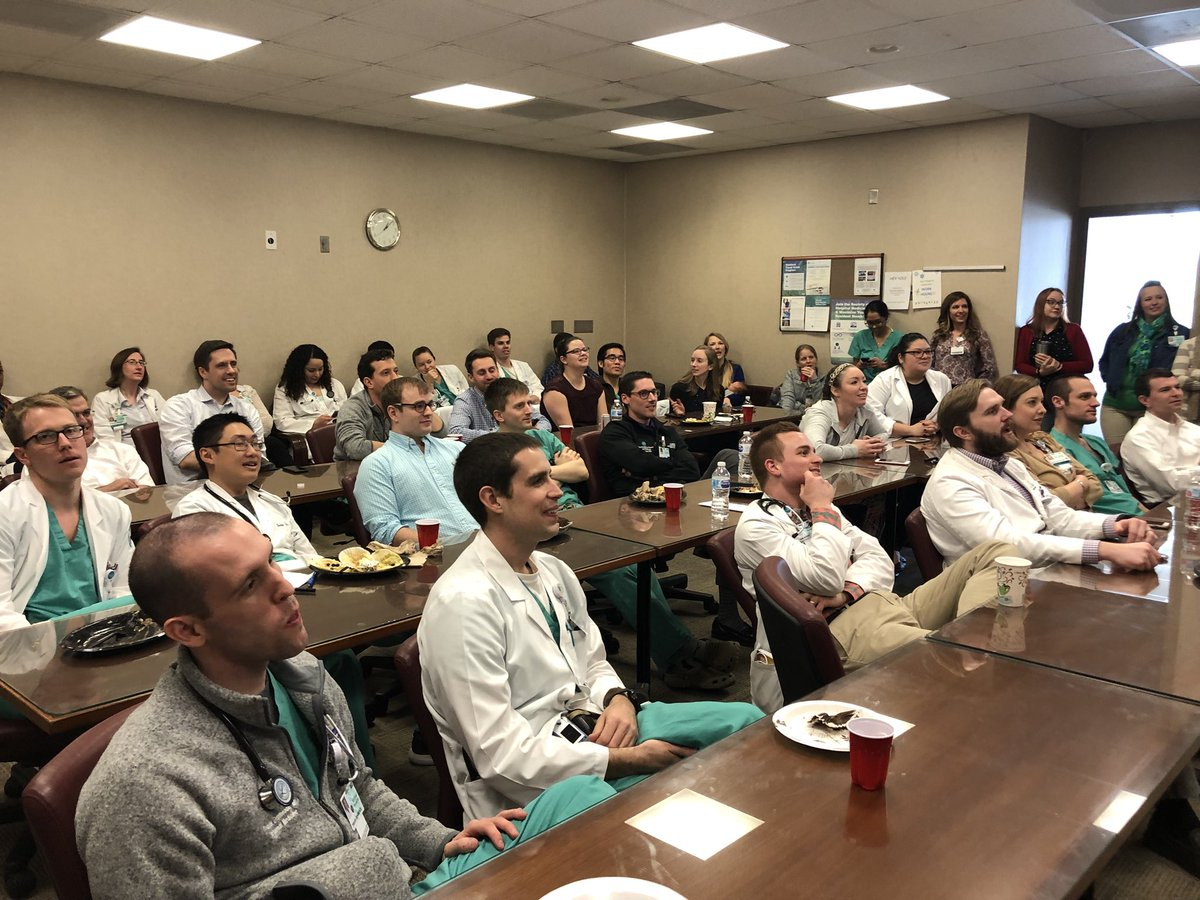 Tuesdays, 1st/3rd Wednesdays, Thursdays, and Fridays from 12:45 p.m. – 1:30 p.m. A wide variety of topics are covered throughout the year. Typically, Tuesdays are reserved for ambulatory general medicine topics. The overall topics are relevant to Internal Medicine's RRC requirements, the In-Training Exam, and the ABIM shelf exam, as well as everyday practice.
Tuesdays, 1st/3rd Wednesdays, Thursdays, and Fridays from 12:45 p.m. – 1:30 p.m. A wide variety of topics are covered throughout the year. Typically, Tuesdays are reserved for ambulatory general medicine topics. The overall topics are relevant to Internal Medicine's RRC requirements, the In-Training Exam, and the ABIM shelf exam, as well as everyday practice.
Our daily didactic curriculum is evaluated anonymously by the house staff and earns excellent ratings because of its relevance, thoroughness, and the outstanding dedication of the faculty.
Departmental Conferences
Each subspecialty division offers its own individual weekly or monthly conferences. Examples include the weekly Tumor Board conference, combined Medical-Surgical GI conference, Pulmonary-Critical Care conference, and Infectious Disease Microbiology Rounds. Individual specialties do a great deal of didactic and bedside teaching on a daily basis in addition to formal lectures.
Inpatient Noon Report
Inpatient Noon Report is held Monday-Friday from 12 Noon-12:40 p.m. This conference is open to medical students, interns, residents, and faculty, and we encourage all to attend. The assigned resident selects an interesting case and provides an evidence-based case presentation. The Chief Resident facilitates discussion with a focus on defining the skills of differential diagnosis.
INTERN-ONLY Morning Report occurs from July-October on Thursday mornings. These conferences focus on the evaluation of core medicine topics such as chest pain, altered mental status, acute renal failure, etc. Only interns are invited, and these sessions are led by an upper level resident. There is a strong emphasis on differential diagnosis and increasing one’s comfort with public speaking.
Morbidity and Mortality Conference is held once per month as a part of our Inpatient Noon Report Series. For our M&M conference series, each PGY-3 resident is assigned a faculty “patient-safety mentor.” After selecting a case in which an adverse outcome or near-miss occurred, the PGY-3 resident meets with his/her patient safety mentor to discuss the case. Following that meeting, each PGY-3 resident has an opportunity to present the case to his/her peers and facilitate discussion on the relevant patient safety issues. The group examines and discusses the case in a low-pressure environment with the goal of improving care in the future.
Finally, a High Value Care Conference is offered once per month as a part of our Inpatient Noon Report Series. This innovative conference series focuses on delivering cost-conscious care in an effort to make our learners more responsible stewards of limited healthcare resources
Outpatient Education
Ambulatory Morning Report: A small group of residents meets every morning at Myers Park Internal Medicine clinic to review a case-based ambulatory topic. We utilize Yale University's Ambulatory Clinic Curriculum, and assign resident leaders to facilitate the weekly topics under faculty mentorship. At the end of each week, all residents are asked to review the weekly presentation material on their own time if they have not been able to attend any of the outpatient sessions. In conjunction with this, all residents are asked to complete a short quiz online for topic review.
Ambulatory Lunch Conference and Symposia: Tuesday lunch conferences are dedicated to ambulatory clinic topics and typically are given by the general medicine faculty. In addition, there are resident symposia held during the year on specific ambulatory topics. Some examples of recent ambulatory symposia topics include pain management, the musculoskeletal office exam, systems of care, and shared decision making.
Ambulatory Pain Management Curriculum: Residents receive longitudinal instruction on safe opioid use for chronic pain. www.scopeofpain.com
Grand Rounds
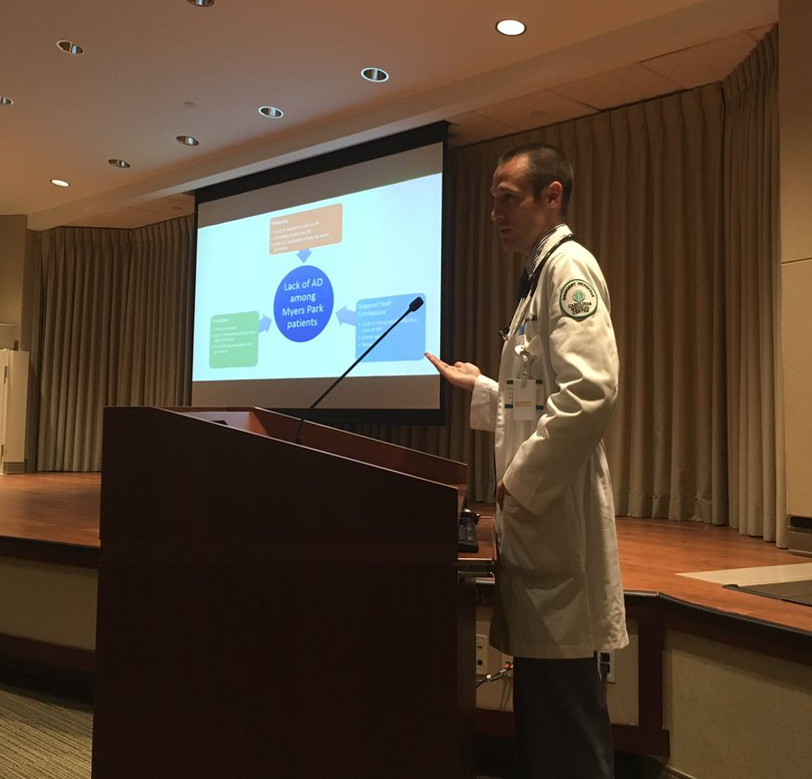
Our Medical Grand Rounds Series is held on the second and fourth Wednesdays of each month from 12:30 p.m. – 1:30 p.m. in the Susanne Freeman Main Auditorium. We routinely host regionally and nationally known speakers from other institutions, and the lecture series also includes presentations given by our own Carolinas Medical Center faculty.
Journal Club
Journal Club is held monthly during noon conference and is led by a PGY-2 resident. Under the mentorship of a faculty member, the PGY-2 resident chooses a recent article and completes a review of the pertinent literature. After the article is presented to his/her peers, the audience has an opportunity to discuss the methodology, findings, and impact on clinical practice. Skills learned include basic statistics, epidemiology, and critical appraisal of medical literature.
Symposia
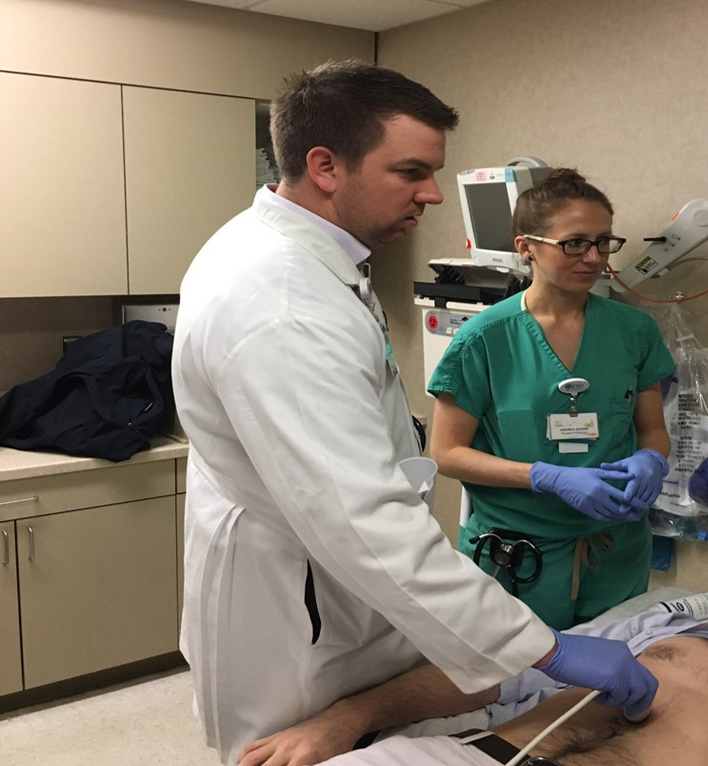 Our symposia are quarterly four-hour workshops on topics crucial to internal medicine that are difficult to review in a one-hour forum. Continuity clinics are canceled so that all residents/faculty may attend. Recent topics included patient handoffs, health care policy, sports medicine, perioperative evaluation/care, alternative medicine, gynecology review, health maintenance and prevention, and palliative care medicine.
Our symposia are quarterly four-hour workshops on topics crucial to internal medicine that are difficult to review in a one-hour forum. Continuity clinics are canceled so that all residents/faculty may attend. Recent topics included patient handoffs, health care policy, sports medicine, perioperative evaluation/care, alternative medicine, gynecology review, health maintenance and prevention, and palliative care medicine.
One of the most popular offerings is our annual two-day “Procedure Workshop.” The Department of Internal Medicine owns multiple simulator models for different procedures for resident education. With the help of our experienced faculty, proper algorithms and model instruction are conducted for the following procedures: arterial line placement, arthrocentesis of the shoulder, central line placement, intubation, lumbar puncture, thoracentesis, and use of ultrasound as an adjunct when performing vascular procedures.
Board Review
The Department of Internal Medicine faculty lead an extensive Board Review Series every year. These sessions are designed for our PGY-3 residents although all are welcome to attend. Generally, this series consists of 1-2 sessions per month in the evenings from September through May. Both our general medicine and subspecialty division leaders are involved with this series and put a tremendous amount of effort into these reviews.
In addition, a lunchtime Board Review series is held occasionally during noon conference. Audience response system technology is used during these sessions to cover difficult topics that frequently come up on the ABIM exam.
Our residents are extremely well-prepared for the ABIM exam by the conclusion of their residency training. Our program's three-year rolling ABIM pass rate is 100% which places us in the top 1% of Internal Medicine residency programs nationwide. In fact, we are the only Internal Medicine residency program in the U.S. with a 100% ABIM first-time pass rate since 2008!
In-Training Exam in Internal Medicine
In our program, categorical residents take the In-Training Exam in Internal Medicine each year that they are in the program. We have found that sitting for the exam annually assists our residents greatly with time management and other skills that are critical to navigating the ABIM exam successfully.
Rising PGY-3 Leadership Seminar
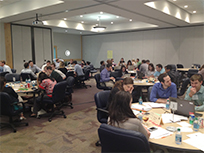
Our rising PGY-3 residents participate in a full-day off-site retreat designed to develop resident teaching and leadership skills. Topics covered include leadership skill development, conflict resolution, resiliency training, and time management, etc.
PGY-2 Resident as Teacher Symposium
This two-day symposium is designed for our PGY-2 residents and led by Drs. Furney and Lloyd. During this popular, interactive conference, our residents are equipped to improve their skills of medical student teaching and feedback.
Simulation Center
Carolinas Medical Center has an extensive, full-time simulation laboratory on campus. The Simulation Center opened in 2007 and is fully accredited by the American 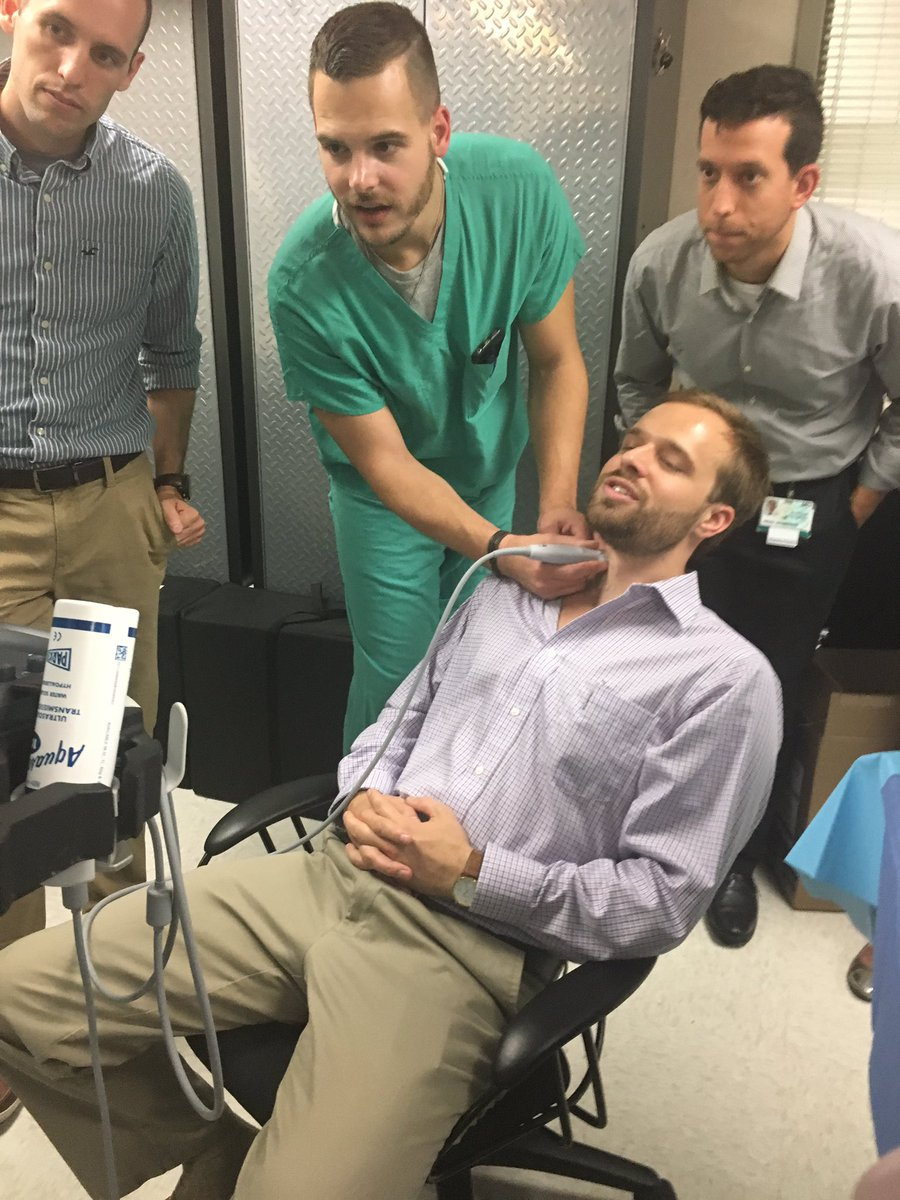 College of Surgeons.
College of Surgeons.
It includes everything from lumbar puncture trainers, knee/shoulder arthrocentesis models, thoracentesis models, to full resuscitation models. We fully utilize the Simulation Center to complement our residents’ training experience including the Intern Patient Safety Skills OSCE and Common Critical Care Curriculum.
View additional information about Carolinas Medical Center’s Simulation Center.
Also, view a list of all of the materials at the center!
Intern Patient Safety Skills OSCE
All of our incoming PGY-1 residents take part in an OSCE [Observed Structured Clinical Exam] during their orientation period. History and physical exam skills, not to mention procedural skills, often vary depending on the level of exposure a particular incoming intern may have had during medical school. Our Intern OSCE is a low pressure mechanism that offers incoming PGY-1 residents direct feedback on several different modules. Topics covered during this session include history taking from a simulated patient, the cardiac and pulmonary exam, LP training, basic suturing and knot tying, foley catheterization, and the pelvic exam. Our incoming trainees have felt the OSCE to be a very valuable experience.
PGY-1 Common Critical Care Curriculum
Later during intern year, all of our PGY-1 residents participate in our Common Critical Care Curriculum (4Cs). This series consists of three 4-hour critical patient care and procedure sessions in the simulation lab. Topics covered during this series include code blue resuscitation, procedure training including central line placement, and scenarios involving delivering bad news to a patient or disclosing a medical error.
Point-of-Care Ultrasound
Our program recently established a point-of-care ultrasound curriculum. Each of our inpatient ward teams has access to a Butterfly iQ® portable ultrasound probe that connects directly with a smart phone or tablet device. Residents also have access to a portable ultrasound device in our ambulatory clinic. Our department features several attendings with interest and experience in bedside ultrasound. 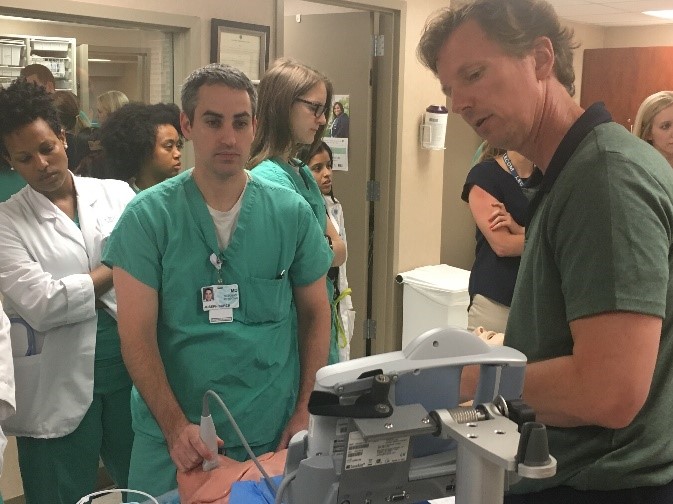
Our experienced faculty lead a weekly small-group point-of-care ultrasound teaching session at the bedside. In addition, our program offers a quarterly departmental ultrasound symposium that combines didactic lecture on the use of bedside ultrasound with standardized patient scanning stations. Residents receive instruction and have opportunities for hands-on practice of pleural effusion imaging, basic cardiac imaging, IVC imaging for volume status, basic abdominal imaging such as presence of ascites/hepatomegaly, and ultrasound imaging in the evaluation of cellulitis and skin abscess.
Our residents also receive instruction and gain experience with ultrasound on our MICU rotation. Our residents become facile with our Sonosite® ultrasound machine in the MICU for procedure guidance such as central line placement.
Finally, interested residents may elect to complete a rotation in bedside ultrasound through our Department of Emergency Medicine.
Schwartz Rounds
This unique conference series is offered every other month and is based on the work of the Schwartz Center for Compassionate Healthcare. These case-based, interactive conferences provide residents and staff from all disciplines to reflect on the emotional aspects of their work. These discussions lead to improved insight, understanding, and connection amongst members of the healthcare team. Furthermore, this series allows participants to reconnect with their values and reaffirm their motivation to work in healthcare.
Rotation Pre and Post Testing
Many of our subspecialty departments administer both a pre-test and post-test for the consult rotations. These tests do not count toward the resident’s evaluation per se but are used for the residents to self-identify areas of weakness to be addressed during the rotation. They also provide an opportunity for the house staff to see how they have improved by the end of the month! Many of these tests are created internally, but we also use some external educational materials. Specifically, we use the Yale Office Based Medicine Curriculum for ambulatory education as well as the Society of Hospital Medicine teaching modules which provide instruction on perioperative care.
International Activities
We encourage our residents to take part in our global health elective experience. We have established partnerships with Tenwek Hospital in Bomet, Kenya, and Mbingo Baptist Hospital in West Cameroon, Africa. Any interested PGY-3 resident may participate in one of these global health elective opportunities. Outside of the established partnerships with Tenwek and Mbingo hospitals, our residents have tremendous flexibility in terms of where they would like to travel and study. All opportunities are reviewed and approved on a case-by-case basis.
Our PGY-2 and PGY-3 residents may apply their annual CME funds (which total $1900/year) toward international rotation travel expenses. Our program leadership is flexible in allowing our residents to find global health opportunities that best fit their learning objectives – whether that be a mission trip combined with Medical Spanish immersion or an intense third world experience to serve as a base for a lifetime of international volunteerism.
The following links are commonly used for residents who are considering these global health opportunities:
